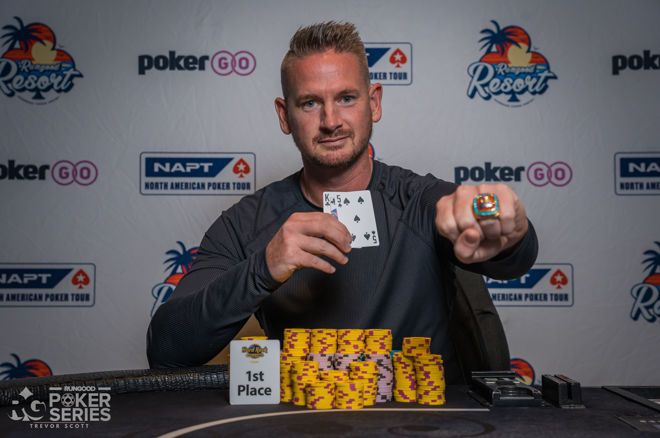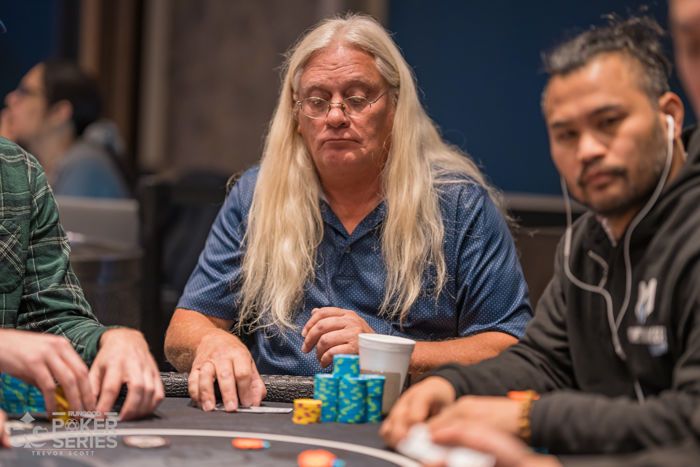lottery Result
Eric Bunch Goes Wiryono rummy promo code today telegrame to Wire to Win RGPS Tulsa Main Event
Share on Twitter Share on Facebook 3 min read
Table Of Contents
- Final Table Results
- Early Day Action
- Final Table
- Heads Up Play
The $800 Main Event of the RunGood Poker Series at the Hard Rock Casino and Hotel Tulsa has concluded. This event attracted 472 entrants across three Day 1 flights, generating a prize pool of $330,400. The 56 players who returned for Day 2 secured a minimum cash of $1,248, with the grand prize set at $65,829. That top prize was awarded to Eric Bunch, who triumphed over Harold Harvey in heads-up play, claiming his first RunGood Poker Series ring.
Bunch entered Day 2 with the overall chip lead after bagging 844,000 on Day 1a. When asked about his mindset for the day, Bunch said, “My main focus was just to make sure I kept playing well and not stress about bad beats or things I can't control.” He successfully maintained that focus, consistently finding himself at the top of the leaderboard throughout the day, essentially going wire-to-wire in the tournament. This win marks one of the top five scores in Bunch's poker career, contributing to his impressive total of over $1,500,000 in tournament earnings. Bunch also said after his victory "I love the RunGood stops, they run great events, I'll definitely be back in January."
Finishing in second place was Harvey, who now boasts over $100,000 in tournament earnings. He took home $43,906, marking a new personal best for him.

Final Table Results
| Place | Player | Country | Prize |
|---|---|---|---|
| 1 | Eric Bunch | United States | $65,829 |
| 2 | Harold Harvey | United States | $43,906 |
| 3 | Han Lam | United States | $32,472 |
| 4 | Jason Wiske | United States | $24,258 |
| 5 | Rob Noce | United States | $18,307 |
| 6 | Iman Alsaden | United States | $13,958 |
| 7 | Savannah Mora | United States | $10,753 |
| 8 | Isaac Cramer | United States | $8,371 |
| 9 | Derrick Yegge | United States | $6,586 |
Early Day Action
A total of 58 entrants qualified for Day 2, including Matt Rogers and Melinda Hettick, who both bagged chips from two different Day 1 flights. Hettick finished in 51st place, receiving two minimum cash payouts for her efforts. Rogers earned a minimum cash for his smaller stack and $1,437 for his 45th-place finish.
Defending champion Todd Tucker, who won the RunGood Poker Series Main Event back in January, was in the mix on Day 2. Unfortunately for Tucker, he could not defend his title, as he was eliminated in 38th place, earning $1,669.
The field included two World Series of Poker bracelet winners: Michael Perrone and Brian Green. Both players were eliminated back-to-back, finishing in 24th and 23rd place, respectively, each earning $2,336 for their efforts in the event.
Day 1b chip leader Timothy Hicks was eliminated on the final table bubble, despite going all in pre-flop and flopping a set of fives. Unfortunately for Hicks, his opponent managed toriver a flush, sending him out in 10th place with a payout of $6,586.

Final Table
The first two casualties at the final table occurred quickly. Derrick Yegge lost a classic flip, finishing in ninth place. Right behind him was Isaac Cramer, who couldn't improve against his opponent's big slick while holding ace-ten suited.
Action slowed down after the first two eliminations until Savannah Mora (seventh) and Iman Alsaden (sixth) were eliminated back-to-back, both unable to improve while being dominated by a superior ace.
Our eventual champion eliminated Rob Noce in fifth place after flopping the nuts in a blind-versus-blind all-in preflop encounter. This decisive hand solidified the champion’s momentum as he continued to build his stack.
Jason Wiske lost a massive pot to Bunch, who made a flush on the river to beat Wiske’s two pair. Wiske then hit the payout desk in fourth place after losing a race with his pocket eights to his opponent's ace-queen.
Finishing in third place was Han Lam, who was short-stacked during three-handed play. He was ultimately knocked out by the champion when Bunch turned a wheel.

Heads Up Play
Entering heads-up play, Bunch held approximately 12,000,000 of the 14,160,000 chips in play. It didn’t take long for Bunch to grind Harvey down to about 600,000 chips before they eventually got all in. Bunch had king-five against Harvey’s jack-three, and as the board ran out, both players made a flush on the river. However, Bunch's flush was the larger one, allowing him to claim the title.
That concludes our coverage here in Tulsa. But be sure to follow PokerNewsfor live updates and coverage from poker tournaments around the globe.
LATEST NEWS
- Skills Strategy, memory, and probability 25-04-06
- Usually played by two to six players, the goal of the game is to combine cards into legal combinations while simultaneously monitoring the betting dynamics. Although it is frequently played in casual settings like homes or social events, the game has become very popular on online gaming platforms. Depending on local tastes, the regulations may differ slightly, but the basic ideas are always the same. 25-04-06
- Players can influence their opponents' behavior & possibly coerce them into making mistakes by, for example, showing confidence when holding weaker cards or placing larger bets when holding a strong hand. Knowing when to fold and when to place large bets can have a big impact on your overall game success, so it's important to strike a balance between aggression and caution. Across many regions, especially in South Asia, where card games have cultural significance, rummy satta has become extremely popular. 25-04-06
- Every player usually starts the game with a certain number of cards drawn from a shuffled deck, with the remaining cards forming a draw pile. When drawing cards, players alternate between the draw and discard piles, trying to create valid sets (three or four cards of the same rank) & sequences (three or more consecutive cards of the same suit). When a player successfully melds every card into a valid combination and declares Rummy, the game is over. The element of betting adds another level of complexity. 25-04-06
- Mastering Rummy: Tips and Strategies for Winning 25-04-06
- Players wager before each round starts according to their perception of their opponents' possible moves and their level of confidence in their hands. Each round has an element of risk and reward due to the wide range of wager amounts. In order to make wise choices, players need to pay attention to both their own hands & how others are betting. A dynamic environment where strategy and intuition are essential for success is created by the interaction of card play and betting. Players who want to succeed at Rummy Satta need to build a strong strategy that includes both betting and card management. 25-04-06
- To increase their chances of winning, players must accurately predict the movements of their opponents, manage their hands, and place well-considered wagers. The combination of skill and chance in Rummy Satta makes it more than just a game of chance; it also calls for strategic thinking & psychological awareness of the actions of rivals. Traditional rummy games that have been played for centuries by people from different cultures are where Rummy Satta got its start. Rummy's history dates back to the early 1800s, when it developed from Mexican-originated games like Conquian. 25-04-06
- Usually played by two to six players, the goal of the game is to combine cards into legal combinations while simultaneously monitoring the betting dynamics. Although it is frequently played in casual settings like homes or social events, the game has become very popular on online gaming platforms. Depending on local tastes, the regulations may differ slightly, but the basic ideas are always the same. 25-04-06
- Players' skills and strategic thinking are put to the test in the popular card game rummy. From a hand dealt to each player, sets & runs of cards must be formed. A standard 52-card deck is used by two to six participants most of the time. Being the first to remove every card from one's hand by making combinations that make sense is the main objective. 25-04-06
- Since sequences are frequently harder for opponents to break, one basic strategy is to give priority to forming sequences over sets. Players can keep their hands flexible while lowering the quantity of cards they must meld by concentrating on making runs of consecutive cards. Also, monitoring which cards have been discarded can give players important information about their opponents' hands, enabling them to decide which cards to draw or discard. Gaining proficiency in bluffing is another essential component of winning at Rummy Satta. Given the importance of betting in the game, players can employ psychological strategies to sway the opinions of their rivals. 25-04-06
CONTACT US
Contact: mi
Phone: 020-123456789
Tel: 020-123456789
Email: [email protected]
Add: 联系地址联系地址联系地址
